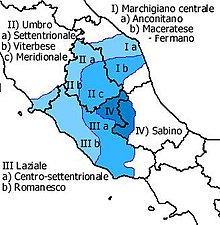Romanesco dialect
| Romanesco | |
|---|---|
| Romano | |
| Native to | Italy |
| Region | Metropolitan City of Rome Capital, Lazio |
|
Native speakers
|
3,000,000 (date missing) |
|
Indo-European
|
|
| Language codes | |
| ISO 639-3 | – |
| Glottolog | None |
| Linguasphere | 51-AAA-rab |
 |
|
Romanesco (Italian pronunciation: [romaˈnesko]) is a variety of regional Italian spoken in the Metropolitan City of Rome Capital, especially in the core city. It is a Central Italian dialect and is thus linguistically close to the Tuscan dialect and Standard Italian. There exist a few notable grammatical and idiomatic differences from Standard Italian. Rich in expressions and sayings, Romanesco is used for informal/colloquial communication by most of the natives of Rome, often with code-switching with the standard language.
The medieval Roman dialect belonged to the central-southern family of Italian dialects, and is much closer to the Neapolitan dialect than to the Florentine. A typical example of Romanesco of that period is Vita di Cola di Rienzo, written by an anonymous Roman during the 14th century. Starting with the 16th century, the Roman dialect underwent a stronger and stronger influence from the Tuscan dialect (from which modern Italian derives) starting with the reigns of the two Medici popes (Leo X and Clement VII) and with the Sack of Rome in 1527, two events which provoked a large immigration of Italians from Central Italy. Therefore, current Romanesco has grammar and roots that are rather different from other dialects in Central Italy.
The path towards a progressive Tuscanization of the dialect can be observed in the works of the major Romanesco writers and poets of the past two centuries: Giuseppe Gioachino Belli (1791-1863), whose sonetti romaneschi represent the most important work in this dialect and an eternal monument to 19th century Roman people; Cesare Pascarella (1858-1940); Giggi Zanazzo (1860-1911); and Carlo Alberto Salustri (1871-1940), nicknamed Trilussa.
...
Wikipedia
